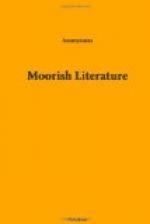The term Moorish is somewhat indefinite, and is used in Spanish history as a synonym of Saracen or Mahometan. It cannot be called a national appellation, though originally in the Augustan age it was applied to the dwellers in Mauretania, with whom the Romans had first come in contact when the war with Hannibal was transferred from Italy and Spain to Africa. In the present day, it may be applied to all the races of northwestern Africa who have accepted Mahometanism; in which case it would include the aborigines of that region, who live not on the coast and in towns, but in the Atlas Mountain and the Sahara Desert. While these races, all Berbers under different local names, are Mussulmans in profession, they are not so highly civilized as their co-religionists who people the coast of the Mediterranean. They live a tribal life, and are blood-thirsty and predatory. They are of course mixed in race with the Arabians, but they are separate in their life and institutions, and they possess no written literature. Their oral literature is, however, abundant, though it is only within quite recent years that it has become known to America and Europe. The present collection of tales and fables is the first which has hitherto been made in the English language. The learned men who collected the tales of the Berbers and Kabyles (who are identical in ethnical origin) underwent many hardships in gathering from half-savage lips the material for their volume. They were forced to live among the wild tribesmen, join their nomad life, sit at their feasts, and watch with them round their camp-fire, while it was with difficulty they transferred to writing the syllables of a barbarous tongue. The memory of the Berber story-teller seems to be incredibly capacious and retentive, and the tales were recited over and over again without a variation. As is to be expected these tales are very varied, and many of them are of a didactic, if not ethical, cast. They are instructive as revealing the social life and character of these mountain and desert tribes.
We find the spirit of the vendetta pervading these tales with more than Corsican bitterness and unreasoning cruelty, every man being allowed to revenge himself by taking the life or property of another. This private and personal warfare has done more than anything else to check the advance in civilization of these tribesmen. The Berbers and Kabyles are fanatical Mahometans and look upon Christians and Jews as dogs and outcasts. It is considered honorable to cheat, rob, or deceive by lies one who does not worship Allah. The tales illustrate, moreover, the degraded position of women. A wife is literally a chattel, not only to be bought, but to be sold also, and to be treated in every respect as man’s inferior—a mere slave or beast of burden. Yet the tribesmen are profoundly superstitious, and hold in great dread the evil spirits who they think surround them and to whom they attribute bodily and mental ills. An idiot is one who is possessed by a wicked demon, and is to be feared accordingly.




